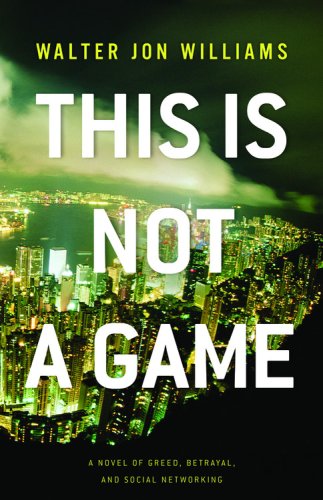I’ve written before about what a brilliant and versatile writer Walter Jon Williams is, so it’s no surprise that his new novel absolutely blew me over. This Is Not A Game is an exciting near-future science fiction story that does everything right.
There are four friends from a college RPG group, and they’re grown up. Charlie is a software millionaire, Austin is a venture capitalist, Dagmar is running a company that runs ARGs, and BJ is a failure working on a helpline and gold-farming to make ends meet. Dagmar gets caught up in Indonesia when the currency collapses and civilization breaks down after it. Her online resources and gaming friends turn out to be more help than she would have expected. But “This Is Not A Game.” There’s an interesting line between fiction and reality in a game like that, and while rescuing Dagmar is real, to the players she enlists to help, that almost doesn’t matter. Things get more complicated from there on, everything turns out to be more complex, more connected, and more satisfyingly resolved, than you would imagine possible.
Williams has always been good at extrapolation, and this is a terrific day-after-tomorrow near future. He’s been involved in various “reality” games and deeply understands how they work. The description of putting the game together and the way it works are
fascinating and realistic. I often find depictions of gaming in fiction very irritating, but Williams knows why people play and what kind of people they are. Early on he uses a description of the four friends’ gaming styles to illuminate their characters. The forum messages between the gamers are just exactly the way these things work. Incidentally, I haven’t seen character developed through online messages done so well since A Fire Upon the Deep.
The economics and software sides of the book also make sense. It isn’t possible to talk about some of the niftiest stuff without major spoilers, and I’m reluctant to spoil anything at all because the pace at which information is revealed is masterful. Things that don’t look as if they’re connected are connected.
The natural thing to compare this to would be Stross’s Halting State. It simply blows it out of the water. It’s several orders of magnitude more complex and more realistic. I quite enjoyed Halting State, but I stayed up half the night finishing This Is Not A Game.
This is an exciting novel with great characters, including a very nice geeky female protagonist. It also has chewy science fiction ideas under the fast-paced action layer. I expect to see it on a lot of next year’s award ballots. I’m surprised I haven’t heard more buzz about it already. This might be because Williams is one of those writers who everyone infuriatingly takes for granted. Oh, another terrific masterpiece that’s not at all like the last book. Well, it’ll be on my Hugo nominations, because I definitely haven’t read five better books this year.
Jo Walton is a science fiction and fantasy writer. She’s published eight novels, most recently Half a Crown and Lifelode, and two poetry collections. She reads a lot, and blogs about it here regularly. She comes from Wales but lives in Montreal where the food and books are more varied.











I got to read this one in MS when Walter was working on it, and I was in on the discussion of the follow-up book which has some of the coolest ideas I have seen in near-future SF possibly ever.
With all due respect, I can’t agree. To me, TINAG was clearly inferior to Halting State – it is a good novel, but not VERY good, not by a stretch. The Indonesian part is mighty fine, yes, but it’s just about a fifth of the whole novel, and the eighty percent that follow feels a little bloated and more than a little wishy-washy.
The economics side of the book… how does it make sense? On the corporate level it doesn’t, not really – the company employing Dagmar chugs along because otherwise there’d be no novel.
The portrait of the gamer community – oh, hey, why don’t I register at some gaming discussion board instead of plonking $$ on the novel that seems to be aimed at bewildered sexagenarians who can’t quite understand their grandchildren? I mean, the insights offered in TINAG in that area are at about Newsweek level of profundity. WJW’s own Implied Spaces was much better in that regard, IMO.
Having read and enjoyed both, I much preferred “Halting State”. HS had a higher geek quotient which I found more satisfying.
I thought that TINAG made more concessions to the non-gaming reader, so for me had less realism. For example, in TINAG, the carefully formatted forum messages came across as much too tidy.
Just read this based on the review here. While it wasn’t a bad book by any means, it also wasn’t as good as I’d hoped.
The characters were a bit lacking in key areas (the MC never seems to have much reaction to her friends’ deaths), the economics were somewhat questionable (I’m in finance and found it slightly implausible, but then again, who really knows what might happen with the collusion on a massive scale that was possible in this book), and the central idea, while clever and interesting, seemed pretty feeble after having just read Rainbows End, which takes a similar idea much further.
Again, not a bad book by any means. Just not great.
Just picked this up based on this review. Loved the book.
Incidentally, the book you’re waiting for to complete the thematic trilogy of reviews is “The Restoration Game” by Ken MacLeod. (I believe it’s due out in the UK next year, and may show up in North America some time thereafter.)